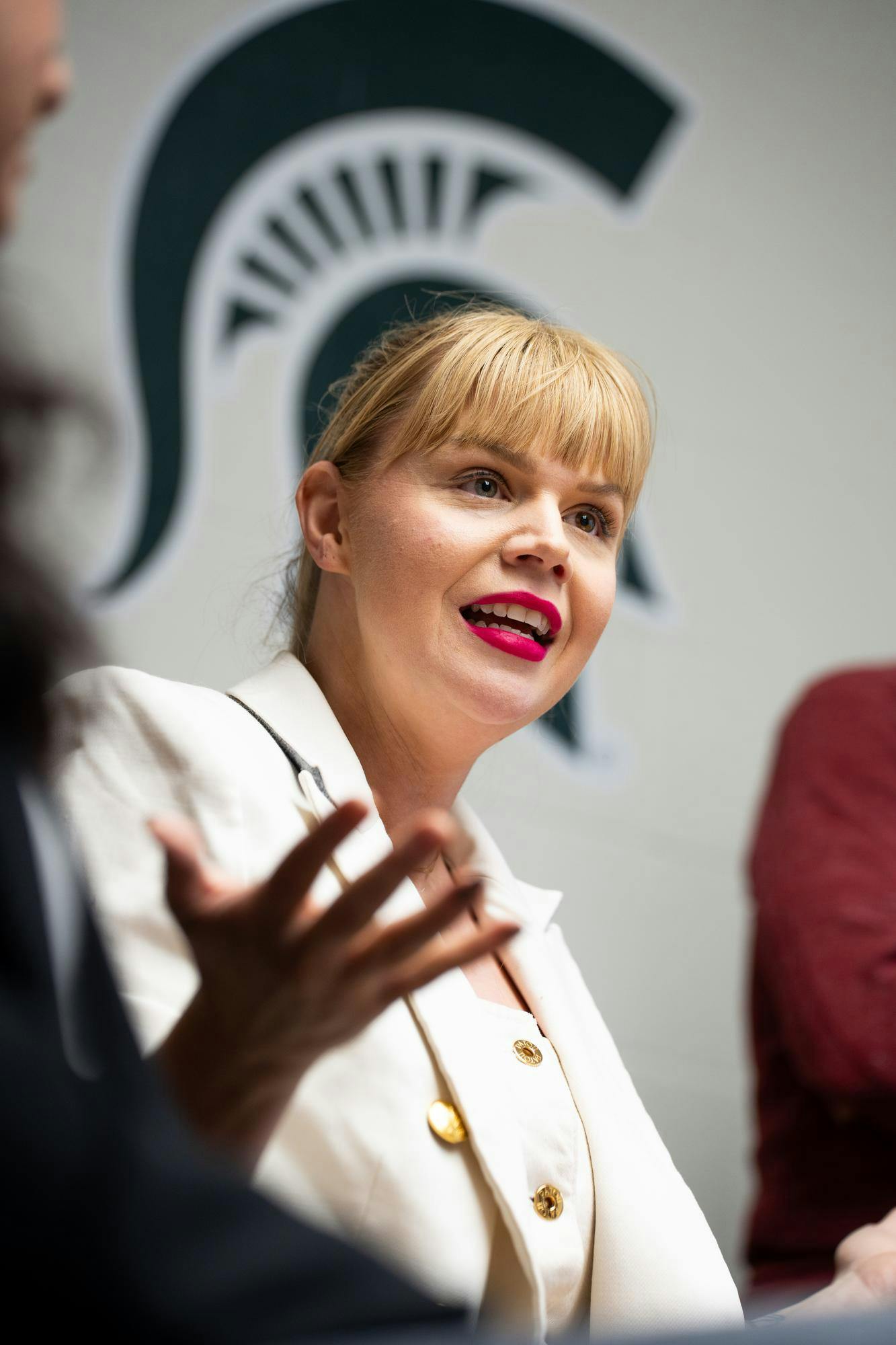As the first-ever Chief Growth Officer, Hilary Doe aims to grow and retain Michigan’s population and economy. She said that few outsiders move into Michigan while many university graduates leave, often heading to cities such as Houston and Atlanta.
Doe spoke at a roundtable for Michigander Scholars, also known as EV Scholars, in the Engineering Building on April 1. Engineering students shared what they look for in job opportunities and how these values influence where they live.
“The more education folks get, we’re less good at retaining those folks, which implies that we need to be connecting folks to great opportunities in our state,” Doe said. “Think about both how we tell the truth better … and also how we change the truth, how we do the policy work to make our place a better and better place to call home.”
Doe has attended over 80 public engagement roundtables across Michigan since June 2023, when Gov. Gretchen Whitmer appointed Doe to this new position.
Electrical engineering sophomore Kyle Foster stressed the importance of affordable housing to Doe, which he said that he believes Michigan may provide less of compared to other states.
“In this financial climate, it’s obviously our first [time] to find an opportunity to build a house or buy a house, and it’s probably a little bit easier to do so in Texas,” Foster said. “When people find opportunities in Texas, it’s more of a long-term settling down. If you can find properties that are affordable, you’re gonna go where they’re affordable.”
A state housing report found that housing affordability is a “major barrier in Michigan.”
Before the COVID-19 pandemic, 48% of Michigan renters and 18% of homeowners already paid too much for housing (over 30% of their income), which worsened after the pandemic, according to the report.
Doe agreed that Michigan housing should be more affordable. She said that the state government should help connect house buyers to potential homes.
Electrical engineering sophomore Timothy Barton said that another important factor when choosing a job is how much previous knowledge they have about the location.
“When you see job descriptions, you’ll see Grand Rapids, Kalamazoo, places you’ve never been before, and it’s like, ‘Okay, this job looks enticing, but do I really want to take it?’” Barton said. “I don’t see a lot about Grand Rapids and Kalazmoo or Traverse City. … You just don’t know enough to actually put yourself there.”
Foster said that many other states are likely to have relocation packages that appeal to more graduates.
Mechanical engineering junior Kylie Keller agreed with Barton about being hesitant to apply to jobs in locations where she knows little about. Being from the Grand Rapids area, Keller felt unsure of job offers from the state’s east coast, such as Dearborn or Livonia. Even though she said that she loves Detroit, she had never been to these places nearby.
Doe said “a staggering number” of University of Michigan students never visit Detroit, which is only a 45-minute drive away from Ann Arbor. Doe said that when she lived in New York City, she rarely met Yale students who had never visited the city, despite having the same distance as Detroit to Ann Arbor.
She said that Detroit "has a lack of exposure."
In late 2023, Michigan Economic Development Corporation, or MEDC, launched You Can in Michigan, a marketing campaign to attract outside talent, focusing primarily on young people with technology skills. Doe believes advertising the city’s highlights, such as festivals typically only known to locals, should encourage not only newcomers but also long-time residents who might not know of everything Michigan has to offer to settle down in Michigan.
Students also said they seek places that promote inclusivity, whether in the workforce or in their communities.
“There’s a difference between an abundance of opportunity and accessibility to opportunity,” Foster said. “I think that students, especially minority students, are gonna prioritize going to places where they have access to opportunities. … It’s really difficult to put yourself out there and market yourself if you don’t have the heritage and the confidence (in your skills), if it’s not really accessible.”
After the roundtable, Doe said the MECD uses these public engagements to hopefully sway legislation outcomes in Fall 2024.
“Michigan is the first to take this population growth challenge when no other state has because it’s not the kind of problem you solve in six months or … in one political term,” Doe said. “No one person can do all this by themself. … It’s on-going, and it’s a group project.”
Support student media!
Please consider donating to The State News and help fund the future of journalism.
Discussion
Share and discuss “Michigan Chief Growth Officer hosts roundtable discussions with MSU students” on social media.







